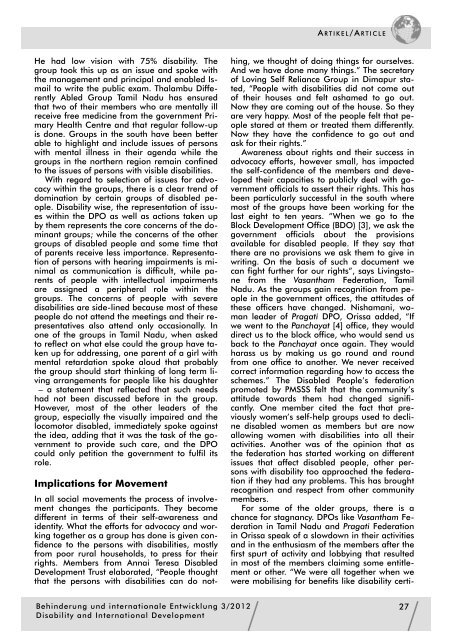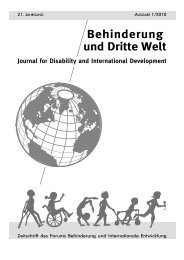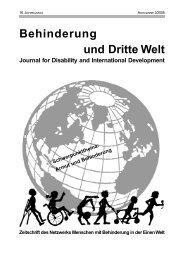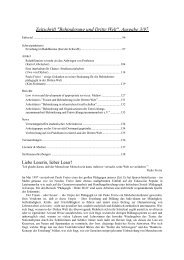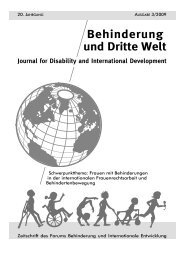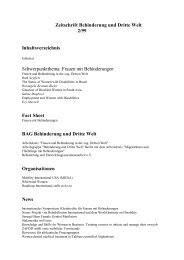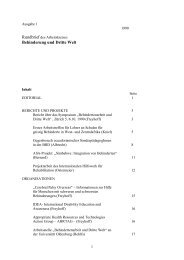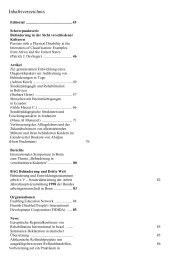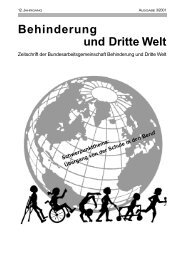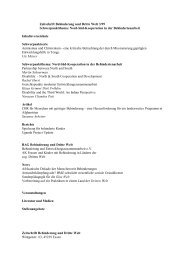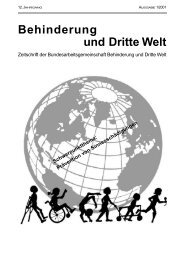Behinderung und internationale Entwicklung Disability and ...
Behinderung und internationale Entwicklung Disability and ...
Behinderung und internationale Entwicklung Disability and ...
Create successful ePaper yourself
Turn your PDF publications into a flip-book with our unique Google optimized e-Paper software.
A RTIKEL/ARTICLEHe had low vision with 75% disability. Thegroup took this up as an issue <strong>and</strong> spoke withthe management <strong>and</strong> principal <strong>and</strong> enabled Ismailto write the public exam. Thalambu DifferentlyAbled Group Tamil Nadu has ensuredthat two of their members who are mentally illreceive free medicine from the government PrimaryHealth Centre <strong>and</strong> that regular follow-upis done. Groups in the south have been betterable to highlight <strong>and</strong> include issues of personswith mental illness in their agenda while thegroups in the northern region remain confinedto the issues of persons with visible disabilities.With regard to selection of issues for advocacywithin the groups, there is a clear trend ofdomination by certain groups of disabled people.<strong>Disability</strong> wise, the representation of issueswithin the DPO as well as actions taken upby them represents the core concerns of the dominantgroups; while the concerns of the othergroups of disabled people <strong>and</strong> some time thatof parents receive less importance. Representationof persons with hearing impairments is minimalas communication is difficult, while parentsof people with intellectual impairmentsare assigned a peripheral role within thegroups. The concerns of people with severedisabilities are side-lined because most of thesepeople do not attend the meetings <strong>and</strong> their representativesalso attend only occasionally. Inone of the groups in Tamil Nadu, when askedto reflect on what else could the group have takenup for addressing, one parent of a girl withmental retardation spoke aloud that probablythe group should start thinking of long term livingarrangements for people like his daughter– a statement that reflected that such needshad not been discussed before in the group.However, most of the other leaders of thegroup, especially the visually impaired <strong>and</strong> thelocomotor disabled, immediately spoke againstthe idea, adding that it was the task of the governmentto provide such care, <strong>and</strong> the DPOcould only petition the government to fulfil itsrole.Implications for MovementIn all social movements the process of involvementchanges the participants. They becomedifferent in terms of their self-awareness <strong>and</strong>identity. What the efforts for advocacy <strong>and</strong> workingtogether as a group has done is given confidenceto the persons with disabilities, mostlyfrom poor rural households, to press for theirrights. Members from Annai Teresa DisabledDevelopment Trust elaborated, “People thoughtthat the persons with disabilities can do nothing,we thought of doing things for ourselves.And we have done many things.” The secretaryof Loving Self Reliance Group in Dimapur stated,“People with disabilities did not come outof their houses <strong>and</strong> felt ashamed to go out.Now they are coming out of the house. So theyare very happy. Most of the people felt that peoplestared at them or treated them differently.Now they have the confidence to go out <strong>and</strong>ask for their rights.”Awareness about rights <strong>and</strong> their success inadvocacy efforts, however small, has impactedthe self-confidence of the members <strong>and</strong> developedtheir capacities to publicly deal with governmentofficials to assert their rights. This hasbeen particularly successful in the south wheremost of the groups have been working for thelast eight to ten years. “When we go to theBlock Development Office (BDO) [3], we ask thegovernment officials about the provisionsavailable for disabled people. If they say thatthere are no provisions we ask them to give inwriting. On the basis of such a document wecan fight further for our rights”, says Livingstonefrom the Vasantham Federation, TamilNadu. As the groups gain recognition from peoplein the government offices, the attitudes ofthese officers have changed. Nishamani, womanleader of Pragati DPO, Orissa added, “Ifwe went to the Panchayat [4] office, they woulddirect us to the block office, who would send usback to the Panchayat once again. They wouldharass us by making us go ro<strong>und</strong> <strong>and</strong> ro<strong>und</strong>from one office to another. We never receivedcorrect information regarding how to access theschemes.” The Disabled People’s federationpromoted by PMSSS felt that the community’sattitude towards them had changed significantly.One member cited the fact that previouslywomen’s self-help groups used to declinedisabled women as members but are nowallowing women with disabilities into all theiractivities. Another was of the opinion that asthe federation has started working on differentissues that affect disabled people, other personswith disability too approached the federationif they had any problems. This has broughtrecognition <strong>and</strong> respect from other communitymembers.For some of the older groups, there is achance for stagnancy. DPOs like Vasantham Federationin Tamil Nadu <strong>and</strong> Pragati Federationin Orissa speak of a slowdown in their activities<strong>and</strong> in the enthusiasm of the members after thefirst spurt of activity <strong>and</strong> lobbying that resultedin most of the members claiming some entitlementor other. “We were all together when wewere mobilising for benefits like disability certi-<strong>Behinderung</strong> <strong>und</strong> <strong>internationale</strong> <strong>Entwicklung</strong> 3/2012<strong>Disability</strong> <strong>and</strong> International Development27


